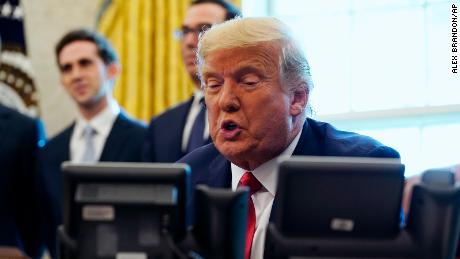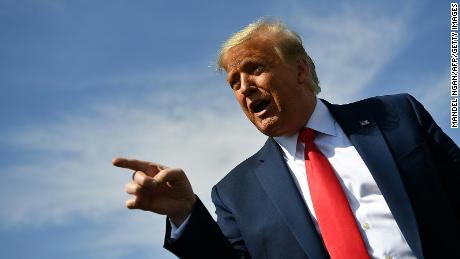Washington (CNN)President Donald Trump announced Friday that Sudan and Israel have agreed to normalize relations -- a foreign policy achievement for the incumbent president less than two weeks before the US presidential election.
Trump made the announcement from the Oval Office while joined on the phone by Israeli Prime Minister Benjamin Netanyahu, Sudanese Chairman of the Sovereignty Council Abdel Fattah al-Burhan and Sudanese Prime Minister Abdalla Hamdok.
According to a joint statement from the three countries, the leaders of Sudan and Israel "agreed to the normalization of relations between Sudan and Israel and to end the state of belligerence between their nations" and "agreed to begin economic and trade relations, with an initial focus on agriculture."
"The leaders also agreed that delegations will meet in the coming weeks to negotiate agreements of cooperation in those areas as well as in agriculture technology, aviation, migration issues and other areas for the benefit of the two peoples. The leaders also resolved to work together to build a better future and advance the cause of peace in the region," the joint statement said.
Netanyahu said Israeli and Sudanese delegations will meet "soon" to begin discussions on cooperation in various fields, such as agriculture and trade.
However, Sudan's acting foreign minister, Omar Gamareldin, told state TV on Friday that the country's legislative council must still approve the normalization agreement.
"This is an agreement to normalize; it is not yet normalization. We must wait for Sudan's democratic institutions to be functional, including the legislative council, so we can complete the ratification of this step so it can become, in reality, normalization. The government cannot unilaterally complete the process of normalization because the government is the Sovereign Council, the Council of Ministers and the Legislative Council," said Gamareldin.
Palestinian leaders slammed the normalization agreement, with one calling it a "serious stab in the back of the Palestinian and Sudanese people." Militant groups in Gaza also voiced their anger.
The normalization announcement came shortly after the White House said Trump had informed Congress of his intent to remove Sudan from the state sponsor of terrorism list. The rescission of the 27-year old designation was widely seen as being tied to the deal with Israel, despite Khartoum's initial desire to keep the issues separate.
Speaking from the Oval Office on Friday, Secretary of State Mike Pompeo said the normalization and move to lift Sudan from the state sponsor of terrorism list "both have one thing in common: They made sense for the Sudanese people."
Pompeo said Sudan "did all the things that they needed to do" to be removed from the list and he noted that the US wanted to support the civilian-led government, which was established after Sudan's strongman leader, Omar al-Bashir, was ousted in a military coup in April 2019 after three decades in power.
"The Sudanese leadership is now driving toward a really strong outcome and improved life for the people of Sudan and we think for the broader region in north Africa as well," he said.
Designation change required by Sudan
Senior government sources in Sudan told CNN earlier this week that the state sponsor of terrorism designation change was a requirement by Hamdok, the leader of the transitional government in Sudan, before talks on normalization could proceed.
"The designation change was our priority and normalization is theirs," one source said.
The Trump campaign has touted the President's foreign policy achievements in the Middle East. In the past several weeks the administration has overseen normalization agreements between Israel and both the United Arab Emirates and Bahrain, and has teased that additional countries could follow suit.
White House press secretary Kayleigh McEnany said in a statement that the formal notification to Congress "follows on Sudan's recent agreement to resolve certain claims of United States victims of terror and their families." Sudan agreed to settle with survivors and families of victims of the 1998 attacks on the US embassies in Tanzania and Kenya, the 2000 attack on the USS Cole and the 2008 murder of US Agency for International Development employee John Granville in Khartoum.
"Yesterday, in fulfillment of that agreement, the transitional government of Sudan transferred $335 million into an escrow account for these victims and their families," she said.
"Today represents a momentous step forward in the United States-Sudan bilateral relationship and marks a pivotal turning point for Sudan, allowing for a new future of collaboration and support for its ongoing and historic democratic transition," she said.
Hamdok thanked Trump for the move to lift the designation.
"We're working closely with the US Administration & Congress to conclude the (state sponsor of terrorism list) removal process in a timely manner," he wrote on Twitter Friday. "We work towards int'l relations that best serve our people."
The spokesman for Sudan's sovereign council, Mohammed Al Faki, told CNN: "We have been formally notified that President Trump has signed the order rescinding Sudan's designation as a State Sponsor of Terror. The order will be enacted in 45 days."
Congress does have the ability to overturn the President's decision to remove the designation, but only if both the House and Senate pass veto-proof joint resolutions of disapproval within 45 days.
Sudan has been listed as a state sponsor of terrorism since 1993, and it is one of only four nations total designated as such. Iran, North Korea and Syria are also listed. As a result, Sudan faces a series of restrictions including a ban on defense exports and sales and restrictions on US foreign assistance.
According to the joint statement, "The United States will take steps to restore Sudan's sovereign immunity and to engage its international partners to reduce Sudan's debt burdens, including advancing discussions on debt forgiveness consistent with the Highly Indebted Poor Countries Initiative."
In her statement Friday, McEnany called on Congress to "act now to pass the legislation required to ensure that the American people rapidly realize the full benefits of this policy breakthrough."
Victim reaction
Stuart Newberger, an attorney at Crowell & Moring who represents US victims of the 1998 embassy bombings and their families, told CNN this week that Congress must pass legislation because the agreement between Washington and Khartoum "requires that Sudan be basically relieved of being sued in federal court as a sponsor of terror under the Foreign Sovereign Immunities Act."
"So that's why Congress has to get involved to provide Sudan what's called 'legal peace.' The President can't do that on his own; that's something only Congress can do," he said.
Such legislation must be passed before the $335 million can be paid out.
However, some are concerned that legislation that implements the settlement will imperil pending litigation from 9/11 families and victims against Sudan.
Others, including some victims of the twin al Qaeda bombings of the US embassies in Nairiobi and Dar es Salaam, have objected to the terms of the settlement -- it would give different payouts to those embassy employees who were US citizens at the time of the attacks, those who have since become US citizens and those who are still foreign nationals.
However, other victims of the bombings and family members welcomed the news earlier this week that Trump intended to lift the state sponsor of terrorism designation and urged Congress "to immediately pass the legislation that is needed to implement the agreement, and begin the payment process."
This story has been updated with further details.





